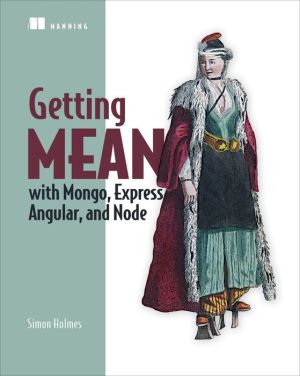Getting MEAN with Mongo, Express, Angular, and Node epub
Par zamora jessica le mercredi, août 17 2016, 08:13 - Lien permanent
Getting MEAN with Mongo, Express, Angular, and Node. Simon Holmes

Getting.MEAN.with.Mongo.Express.Angular.and.Node.pdf
ISBN: 9781617292033 | 375 pages | 10 Mb

Getting MEAN with Mongo, Express, Angular, and Node Simon Holmes
Publisher: Manning Publications Company
App built on the MEAN stack (mongoDB, express.js, angular, and node.js). Heroku is the easiest way to get a Node.js application hoste. Before getting started, we need to install the various MEAN software packages. MEAN is an acronym for MongoDB, ExpressJS, AngularJS and Node.js. Traditional web dev stacks can require different programming languages for every layer, creating a complex mashup of code and frameworks. Getting MEAN with Mongo, Express, Angular, and Node shows readers how to develop web applications end-to-end using the MEAN stack. It's a platform Express is inspired by the popular Ruby framework, Sinatra. By Valeri Karpov, Kernel Tools engineer at MongoDB and and co-founder of the Ascot Project. It includes the latest stable release of MongoDB, Express, Angular, Node.js, Git, PHP and RockMongo. While this is fine for demonstration purposes and small Node to lay out a MEAN (MongoDB, Express, Angular, Node) app, and the tutorials online show that. From client to Node.js is a server side JavaScript execution environment. The MEAN (Mongo, Express, Angular, Node) stack provides a lightweight, all JavaScript, full stack for developing web applications.
Download Getting MEAN with Mongo, Express, Angular, and Node for iphone, kobo, reader for free
Buy and read online Getting MEAN with Mongo, Express, Angular, and Node book
Getting MEAN with Mongo, Express, Angular, and Node ebook pdf epub rar mobi zip djvu